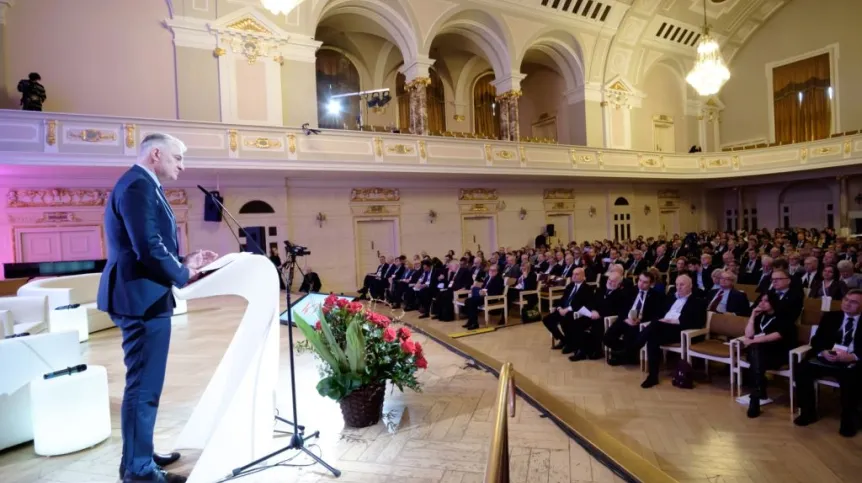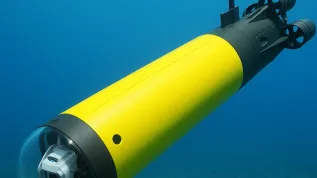
Developing new solutions concerning the path of scientific advancement and the parameterisation of science, widely acceptable in academia - according to Minister of Science Jarosław Gowin these are the greatest challenges in the pursuit of excellence in Polish science.
Last Thursday in the capital of Wielkopolska, Deputy Prime Minister, Minister of Science and Higher Education Jarosław Gowin attended the program conference of the National Congress of Science "Scientific excellence - how to be equal to the best". He stressed that scientific excellence is of fundamental importance for the creation of the new law on higher education, the so-called Law 2.0.
Minister of Science emphasized in Poznań that one of the greatest challenges in the pursuit of scientific excellence will be "developing new solutions, widely acceptable in academia, concerning the path of scientific advancement and the parameterisation of science, or the system of evaluation of scientific achievements".
As he spoke, in Poland "the average age of achieving scientific independence, or obtaining the title of associate professor (habilitation), is 46 years". "Abroad, especially in Western Europe or the United States, researchers achieve independence on average 10, or even a dozen years earlier. (...) The other side of the coin is the question of how to prevent something that is already happening, i.e. devaluation and lower level of Polish doctorates and Polish habilitation" - he added.
According to Gowin it is very difficult to find a solution that on the one hand would clear the path of advancement for young scientists, on the other - as he said - "we have to (...) avoid solutions that would lead to an epidemic of pseudo-doctorates and pseudo-habilitations".
He noted that the issue of new regulations concerning the scientific career path is very important, because even now many young Polish scientists choose to go abroad - also because it is easier for them to develop and conduct independent research in other countries.
"Why is it that today 35 thousand Polish scientists work at universities around the world? They were driven out of Poland not only by the relatively low level of funding for Polish science. They very often leave because they feel that here their scientific careers are blocked by excessively feudal, overly hierarchical, in a bad sense, relations in the academic community" - he stressed.
He added that work was already underway on different variants of solutions to these issues. "One of these options is the concept of the so-called large doctorate" - he said.
Gowin noted that the Ministry of Science and Higher Education was now entering the crucial phase of work on the new law on higher education. As he said, this bill was extremely important, because science, in addition to the prestige and value "in itself", has real and "deep impact on the quality of life, standard of living of all Polish citizens".
In his opinion, "there will be no innovative economy unless Polish economy is to a much greater extent than before based on the discoveries of Polish scientists".
"The strategy for scientific excellence, for the reform of higher education, is complementary to the Responsible Development Plan, which is why we work so closely with Prime Minister Morawiecki and other ministers, because the condition for the success of the plan (...) is to increase the emphasis on the development of science" - added the Minister of Science.
He stressed that the development of Polish science would not happen without more funding. He noted that while in terms of scientific achievements, measured by the number of articles cited or published in prestigious journals, Poland is at the end of the second ten in the world, in terms of the level of funding for science - Poland is the end of the fourth ten. "It is clear that we have a lot to catch up on, and I believe that in the next year\'s budget, these financial needs, not only of the Polish science, but of the whole Polish society that will develop through scientific achievements, these needs will be addressed" - he said.
According to the minister, Polish science needs profound changes and now faces the challenge associated with the functioning of Polish universities and research units. As he spoke, over the previous quarter of a century, governments emphasised the postulate of mass education of students, which was also reflected in the way of funding universities.
"It has its advantages, because in terms of the percentage of young people who finish their studies we are in the forefront, but we are all aware that gradually, and with time more acutely, the negative side effects of this solution began to surface. These negative effects were mainly low and dropping quality of education" - said Gowin.
He added that the departure from the education massification process must go hand in hand with greater emphasis on raising the level of studies and increased internationalisation of Polish universities and Polish science. As he said, "science develops well in a dialogue, and that includes a transnational dialogue".
"Is the development of scientific excellence possible while remaining in isolation? I doubt it. (...) We must open more widely to international cooperation, and that also means significantly more foreign lecturers at Polish universities. I am aware that the mental changes are one thing. Another thing is the need to remove defects in the system. The current system, plagued by rightly hated point-scoring disease, motivates para-scientific activities. It motivates to support centres that carry out exiguous activities, conducted exclusively for the sake of Polish requirements" - said the Deputy Prime Minister.
As he spoke, he had taken a few months to review the rules of parameterisation, which is the evaluation of research units. "I do not understand many details of the current parameterisation system. (...) There are many loopholes in this system" - he emphasised. Developing new rules of parameterisation is one of the most important tasks of his ministry.
"In the context of the forthcoming Law 2.0, most of the questions regarding the parameterisation and evaluation of Polish science remain open. We cannot escape from scoring publications as a measure of efficiency, scientific activity" - said the head of the science ministry. But - as he said - other questions, for example how it should be shaped, to what extent it should take into account the specificities of different disciplines, remain open.
"Without a doubt, the logic of distribution of funds for scientific research, especially public funds, should be focused on scientific excellence. While we should continuously increase spending on science, we should also remember that the funds should (...) translate into benefits. Injecting funds into existing structures is not enough to ensure the development of science that would reflects our aspirations" - argued Gowin. "Well-designed competitions for research grants stimulate scientific excellence and should remain a very important, in my opinion the most important stream of research funding" - the minister noted.
Referring to the Polish scientific and research infrastructure, Gowin said that in many ways it was at "an impressively high level". He also reminded that the Ministry of Science and Higher Education recently signed a letter of intent with the city of Wrocław to acquire a stake in the Research Centre EIT+.
Thursday speech of the Minister of Science in the auditorium of the Poznań university was interrupted by a voice from the audience. A woman referred to the three drafts of the principles of the new law on higher education, presented by teams of experts, saying that "when it comes to these three projects, you have all probably seen them - they are terrible".
"I think that we will have an opportunity to discuss these projects today and tomorrow. You will have the opportunity to share your opinions. I do not think that any of these projects could be called terrible. On the contrary, they all seem very inspiring to me. Neither do I think that a number of important decisions that lie ahead have already been decided. The purpose of debates like the one we are having today is to jointly reach the solutions" - said Gowin.
The conference "Scientific excellence - how to be equal to the best" held on Thursday and Friday at Adam Mickiewicz University in Poznań was part of a series of debates preceding the National Congress of Science that will be held in September in Kraków. At the congress, the Ministry of Science will present the principles of the new law on higher education. It will be prepared on the basis of proposals from three independent research teams that were selected in May 2016 in a Ministry of Science competition and received grants to prepare and consult the principles of the new law. All three teams have already submitted the results of their work to the Ministry.
PAP - Science and Scholarship in Poland, Anna Jowsa, Ewelina Krajczyńska
ajw/ ekr/ agt/
tr. RL













